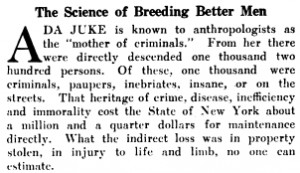SOURCE: Frank Taussig, Principles of Economics, Volume II, 1911. Pages 233-237. This movement is steadily extending, and is gradually affecting not only those who are usually thought of as being in a more special sense “native born,” but the descendants of the immigrants as well. The influence of free institutions and of free opportunities is …
Category: family (the institution of)
Eugenics as a Religion and Social Darwinism, Collin Wells
Source: Dr. Collin Wells, “Social Darwinism” a paper presented in 1907, found in The American Journal of Sociology, pages 706-709 Finally, what is the evolutionary value of certain ideals? Let us take individualism, the ideal of democracy, which has tacitly figured in many of the phenomena to which I have already referred. Let us go …
Scientific American: “The Science of Breeding Better Men” 1911
Editorial from a 1911 edition of Scientific American [Source]: Sci-Am’s Editor’s note: This editorial was written and published in 1911. Although our editors of a century ago pondered some lofty aspirations for the orderly future of humans, it was only three decades later that the brutal reality of a Nazi social order suffused with a …
Excerpt: Darwin’s Dilemma as told by Bertrand Russell, from Designing Babies
From Designing Babies: The Brave New World of Reproductive Technology by Roger Gosden. W.H. Freeman and Company, New York. 1999. Page 3-4 According to Darwin’s theory, natural selection decides which individuals are fit to survive and breed. So powerful was this idea that it quickly engaged not only fellow biologists but also intellectuals who were …
Eugenics Must Begin with the Family: Paul Popenoe
From David Popenoe in War Over the Family p 235-236 (regarding his father, Paul Popenoe): In keeping with the decline of hereditarianism in American intellectual life, Paul Popenoe gradually shifted his professional efforts from genetic improvement to family improvement. With the help of some influential financial donors, he started the American Institute of Family Relations (then …
Separating Sex from Reproduction, the School, and the State
“The family is already being eroded by the intervention of school and state, and [the separation of sex from reproduction] might be its coup de grace.” G. Taylor, 1968
Eugenics and Christianity in a Letter to the Eugenics Review
Norman A. Thompson, “Eugenics and Christianity”, published in The Eugenics Review, pages 346-347 (1933) [Source] To the Editor, Eugenics Review Sir, In these latter days of the general liquefaction of ideas, philosophies, and policies, whether founded on dogma or tradition, or on other bases, which may have satisfied our understanding at earlier stages of the …
Frederick Osborn, Galton and Mid-Century Eugenics, 1956 Eugenics Review published lecture and “Voluntary Unconscious Selection”
Frederick Osborn, president of the Population Council and steadfast advocate for eugenics, in a 1956 speech recorded in the Eugenics Review. [SOURCE] […] Galton never envisaged any system of arbitrary controls, except for the more serious mental and physical handicaps, which should be treated like a form of communicable disease. But he did propose that …
Clarence Gamble–the problem is that people WANT many children!
“Family Planning” is often advocated for on the grounds that many people do not want many children, but the truth is the opposite–at least, until the propaganda is brought to bear on them. The need for this propaganda was recognized early, as this quote illustrates. Richard B. Gamble writes in the foreword (1977) of the …
Gordon Rattray Taylor: “The Biological Time Bomb” — the remaking of society via eugenics, family planning, and education
Gordon Rattray Taylor’s 1968 book, The Biological Time Bomb, was referenced in the Roe vs. Wade Supreme Court ruling as providing insight on future developments in America. Taylor’s book was released at a time when the term ‘eugenics’ had not yet fallen out of favor. Though he does not explicitly endorse many of the things …


Recent Comments